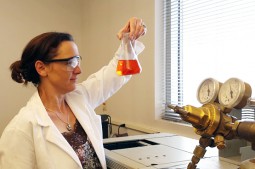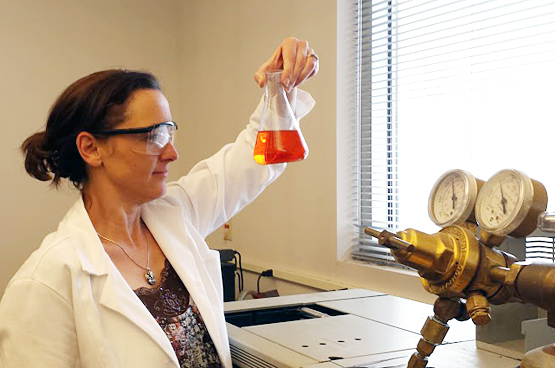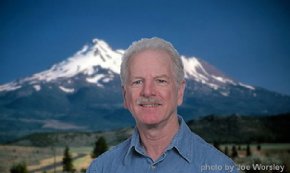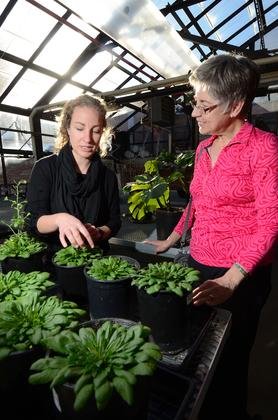 Greenback Cuttthroat Trout (starts at 6:06) Colorado has always been a state of nature lovers, which is why, in the era of our great great grandfathers, citizens even designated an official state fish. It’s the Greenback Cutthroat Trout that thrived in the mountain streams above Boulder and Denver. Colorado wildlife officials had long assumed that Greenback Cuttthroat Trout still live in our mountain streams. The problem is, they were wrong. Through a complex set of Sherlock Holmes investigations begun in recent years, scientists at CU-Boulder figured out a “fish switch” decades ago, meant Greenback Cutthroat Trout were missing from our streams, and possibly extinct. Since then, we have much better news about the fish that “almost” got away. In this feature, How on Earth’s Shelley Schlender, speaks with CU-Boulder biologist, Jessica Metcalf. (To access photos of greenback cutthroat trout go to http://photography.colorado.edu/res/sites/news/ and type “cutthroat” in the search box.)
Greenback Cuttthroat Trout (starts at 6:06) Colorado has always been a state of nature lovers, which is why, in the era of our great great grandfathers, citizens even designated an official state fish. It’s the Greenback Cutthroat Trout that thrived in the mountain streams above Boulder and Denver. Colorado wildlife officials had long assumed that Greenback Cuttthroat Trout still live in our mountain streams. The problem is, they were wrong. Through a complex set of Sherlock Holmes investigations begun in recent years, scientists at CU-Boulder figured out a “fish switch” decades ago, meant Greenback Cutthroat Trout were missing from our streams, and possibly extinct. Since then, we have much better news about the fish that “almost” got away. In this feature, How on Earth’s Shelley Schlender, speaks with CU-Boulder biologist, Jessica Metcalf. (To access photos of greenback cutthroat trout go to http://photography.colorado.edu/res/sites/news/ and type “cutthroat” in the search box.)
 Migraines (starts at 14:28) One of the most painful conditions to suffer through is a migraine headache. Sometimes, these headaches begin with strange visual auras or loss of vision; sometimes they’re accompanied by nausea. Most of all, they’re a head-splitting pain. Interestingly, these headaches are rare among the world’s few remaining hunter-gatherer populations. In contrast, they’re common in modern western life. Roughly 10% of Americans have suffered from a migraine headache. One of the people who used to suffer from them frequently is a medical doctor with advanced degrees in neurology. He’s Doctor Josh Turknett. Dr. Turknett used to get 60 migraines a year – on average, that’s over one a week. As a board certified neurologist, Turknett treated the migraines of his clients, and his own migraines, in typical medical ways – urging people to drink enough water, get enough sleep, avoid too much stress, try to figure out triggers, such as maybe foods or smells, and to take strong medications when the headaches got unbearable. For Turknett, his whole life changed dramatically when he made a basic lifestyle change that he believes many neurologists and migraine sufferers overlook. In his own case, his change meant that the number of migraines he suffers these days has gone from around 60 headaches a year, down to only two or three. While his approach is controversial, Turknett believes it could help many, perhaps most, migraine sufferers. How on Earth’s Shelley Schlender caught up with Turknett this weekend at the Ancestral Health Symposium in Berkeley, California, where Turknett was a speaker. Up next, here’s Neurologist and former big time migraine sufferer, Josh Turknett.
Migraines (starts at 14:28) One of the most painful conditions to suffer through is a migraine headache. Sometimes, these headaches begin with strange visual auras or loss of vision; sometimes they’re accompanied by nausea. Most of all, they’re a head-splitting pain. Interestingly, these headaches are rare among the world’s few remaining hunter-gatherer populations. In contrast, they’re common in modern western life. Roughly 10% of Americans have suffered from a migraine headache. One of the people who used to suffer from them frequently is a medical doctor with advanced degrees in neurology. He’s Doctor Josh Turknett. Dr. Turknett used to get 60 migraines a year – on average, that’s over one a week. As a board certified neurologist, Turknett treated the migraines of his clients, and his own migraines, in typical medical ways – urging people to drink enough water, get enough sleep, avoid too much stress, try to figure out triggers, such as maybe foods or smells, and to take strong medications when the headaches got unbearable. For Turknett, his whole life changed dramatically when he made a basic lifestyle change that he believes many neurologists and migraine sufferers overlook. In his own case, his change meant that the number of migraines he suffers these days has gone from around 60 headaches a year, down to only two or three. While his approach is controversial, Turknett believes it could help many, perhaps most, migraine sufferers. How on Earth’s Shelley Schlender caught up with Turknett this weekend at the Ancestral Health Symposium in Berkeley, California, where Turknett was a speaker. Up next, here’s Neurologist and former big time migraine sufferer, Josh Turknett.
Hosts: Kendra Krueger, Joel Parker
Producer & Engineer: Joel Parker
Additional Contributions: Beth Bennett, Shelley Schlender
Executive Producer: Joel Parker
Listen to the show:
Podcast: Play in new window | Download (Duration: 24:24 — 22.3MB)
Subscribe:






 Ketones (start time 6:40) A growing body of scientific research demonstrates health benefits for many people with a diet that’s lower in carbohydrates, and higher in fats. In fact, some of this research indicates great therapeutic benefits,. One reason why may be that, when carbohydrate consumption is low enough, the body enters a state of “nutritional ketosis,” where it transforms fats into a molecule called, beta-hydroxy-butyrate, or “ketones”. In the absence of sugar and carbs, the body can use ketones as its primary fuel.
Ketones (start time 6:40) A growing body of scientific research demonstrates health benefits for many people with a diet that’s lower in carbohydrates, and higher in fats. In fact, some of this research indicates great therapeutic benefits,. One reason why may be that, when carbohydrate consumption is low enough, the body enters a state of “nutritional ketosis,” where it transforms fats into a molecule called, beta-hydroxy-butyrate, or “ketones”. In the absence of sugar and carbs, the body can use ketones as its primary fuel.
 Greenback Cuttthroat Trout (starts at 6:06) Colorado has always been a state of nature lovers, which is why, in the era of our great great grandfathers, citizens even designated an official state fish. It’s the Greenback Cutthroat Trout that thrived in the mountain streams above Boulder and Denver. Colorado wildlife officials had long assumed that Greenback Cuttthroat Trout still live in our mountain streams. The problem is, they were wrong. Through a complex set of Sherlock Holmes investigations begun in recent years, scientists at CU-Boulder figured out a “fish switch” decades ago, meant Greenback Cutthroat Trout were missing from our streams, and possibly extinct. Since then, we have much better news about the fish that “almost” got away. In this feature, How on Earth’s Shelley Schlender, speaks with CU-Boulder biologist,
Greenback Cuttthroat Trout (starts at 6:06) Colorado has always been a state of nature lovers, which is why, in the era of our great great grandfathers, citizens even designated an official state fish. It’s the Greenback Cutthroat Trout that thrived in the mountain streams above Boulder and Denver. Colorado wildlife officials had long assumed that Greenback Cuttthroat Trout still live in our mountain streams. The problem is, they were wrong. Through a complex set of Sherlock Holmes investigations begun in recent years, scientists at CU-Boulder figured out a “fish switch” decades ago, meant Greenback Cutthroat Trout were missing from our streams, and possibly extinct. Since then, we have much better news about the fish that “almost” got away. In this feature, How on Earth’s Shelley Schlender, speaks with CU-Boulder biologist,  Migraines (starts at 14:28) One of the most painful conditions to suffer through is a migraine headache. Sometimes, these headaches begin with strange visual auras or loss of vision; sometimes they’re accompanied by nausea. Most of all, they’re a head-splitting pain. Interestingly, these headaches are rare among the world’s few remaining hunter-gatherer populations. In contrast, they’re common in modern western life. Roughly 10% of Americans have suffered from a migraine headache. One of the people who used to suffer from them frequently is a medical doctor with advanced degrees in neurology. He’s Doctor
Migraines (starts at 14:28) One of the most painful conditions to suffer through is a migraine headache. Sometimes, these headaches begin with strange visual auras or loss of vision; sometimes they’re accompanied by nausea. Most of all, they’re a head-splitting pain. Interestingly, these headaches are rare among the world’s few remaining hunter-gatherer populations. In contrast, they’re common in modern western life. Roughly 10% of Americans have suffered from a migraine headache. One of the people who used to suffer from them frequently is a medical doctor with advanced degrees in neurology. He’s Doctor 



